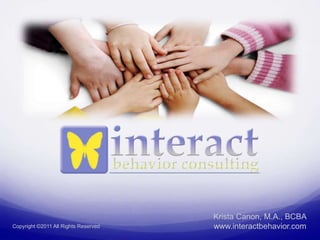Contenu connexe
Similaire à Introduction to Interact Behavior Consulting
Similaire à Introduction to Interact Behavior Consulting (20)
Introduction to Interact Behavior Consulting
- 2. Mission and Philosophy
Interact Behavior Consulting (IBC) is committed to
creating individualized programs for each child that are
based on the principles of Applied Behavior Analysis
(ABA).
IBC's mission is to teach our clients the skills needed to
make progress towards independence and to train
family, staff, and educators in the best methods for
supporting the client's needs.
Small clinician caseloads in order to provide the
optimal level of service for each client.
Copyright ©2011 All Rights Reserved
- 3. Programs and Services
Early Intervention
Home-based ABA services (adaptive skills)
Functional Behavior Assessments (FBA)
Parent education and training
Consultation to educators and professionals
Copyright ©2011 All Rights Reserved
- 4. Comprehensive Program Model
Initial consultation
Initial assessment
Development of program goals
1:1 sessions
Staff and parent training/consultation
On-going assessment
Team meetings
Copyright ©2011 All Rights Reserved
- 5. Assessment Methods
Norm-referenced/Developmental
Vineland-II
Criterion-referenced
Assessment of Basic Language and Learning Skills (ABLLS)
Verbal Behavior Milestones Assessment and Placement
Program (VB-Mapp)
Assessment, Evaluation, and Programming System for Infants
and Children (AEPS®)
Other
Parent/caregiver interviews (FAI, FAST, etc.)
Direct observation (ABC data, frequency, duration, etc.)
Preference assessments (formal and informal)
Copyright ©2011 All Rights Reserved
- 6. Early Intervention:
Curriculum Goals
Addressing skill deficits in these areas:
Language/Verbal Behavior
Social Skills
Play skills
Pre-academic
Self-help skills
Psychosocial development
Fine & Gross motor skills
Copyright ©2011 All Rights Reserved
- 7. Home-based ABA:
Curriculum Goals
Addressing skill deficits in these areas:
Functional language/Verbal Behavior
Pro-social Behavior Goals
Play/social skills
Self-help skills
Psychosocial development
Fine & Gross motor skills
Copyright ©2011 All Rights Reserved
- 8. FBA:
Behavior Goals
Reducing behaviors that interfere with learning and social
development:
Define target behaviors in descriptive, quantifiable
terms
Predict when behaviors will occur
Determine why the behaviors are occurring
Develop behavior support strategies (Behavior Support
Plan)
Copyright ©2011 All Rights Reserved
- 9. Parent Training and
Education
Instruction in basic principles of ABA
In-vivo training on skill acquisition programs
Training on Behavior Support Plan components
General ABA-based strategies on behavior
management
Frequent meetings as feasible for client family
Copyright ©2011 All Rights Reserved
- 10. ABA Teaching Methods
Examples of teaching methodologies used:
Discrete Trial Training
Verbal Behavior Analysis
Fluency Teaching
Natural Environment Teaching
Pivotal Response Training
Copyright ©2011 All Rights Reserved
- 11. Entrance Criteria
Age
Early Intervention: Birth – 3 years old
Home-based ABA: 3 years old – 18 years old
FBA: 3 years old – 18 years old
Developmental disability and delays in the areas of self-help;
receptive and expressive language; learning; mobility; self-
direction; independent living; and economic self-sufficiency
Parents/caregivers must be able to commit to parent training
sessions
Additional entrance criteria may be determined by third party
payers (e.g., health insurance)
Copyright ©2011 All Rights Reserved
- 12. Exit Criteria
Age
Early Intervention: 3 years old
Home-based ABA: 18 years old
FBA: 18 years old
Clients graduate from the program when the treatment
team determines the child and family has made
sufficient progress on instructional and behavioral goals
that result in measurable outcomes
Additional exit criteria may be determined by third party
payer (e.g., health insurance)
Copyright ©2011 All Rights Reserved
- 13. Clinicians
Behavior Analysts/Clinical Supervisors
Masters or Doctorate degree in ABA, psychology, special
education or related field
Board Certified Behavior Analyst
Program Supervisors
Masters or Doctorate degree in ABA, psychology, special
education or related field
2 years minimum in supervisory experience
Behavior Therapists
Bachelors degree in ABA, psychology, special education
or related field
Copyright ©2011 All Rights Reserved
